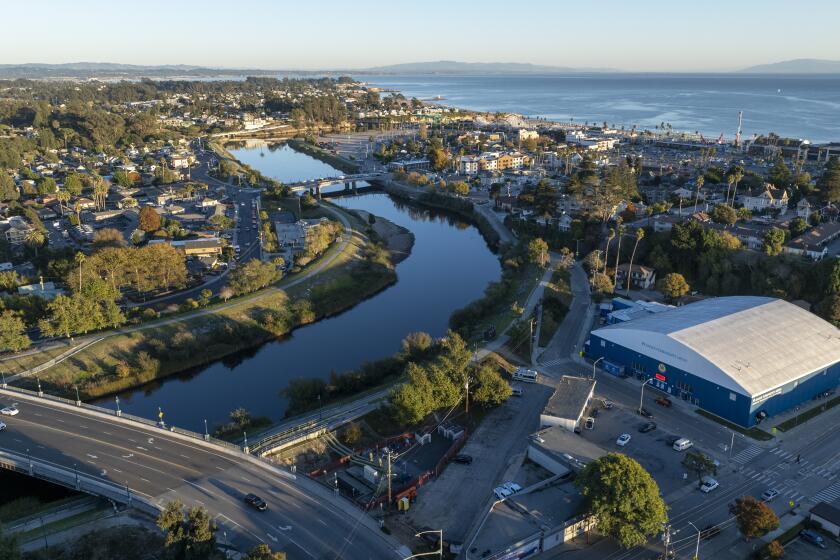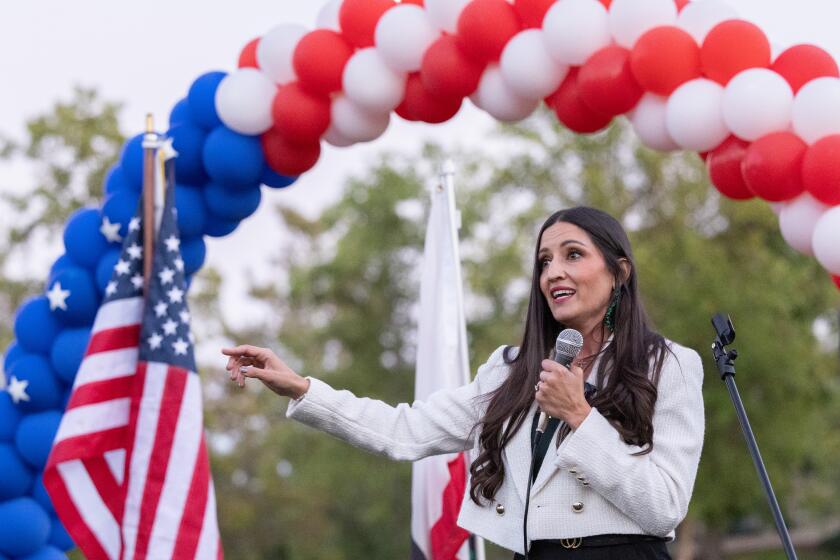Huntington Beach is sticking it to ‘woke’ California. Some residents ask at what cost
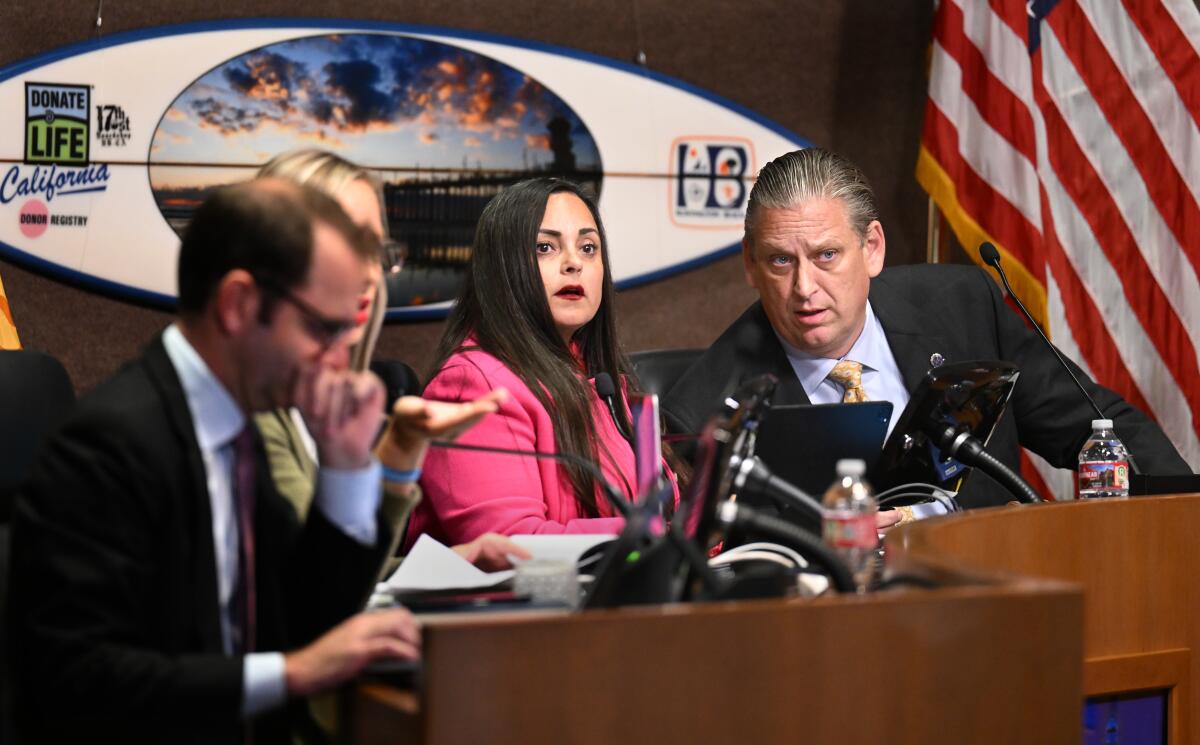
- Share via
Just three months after being elected to the Huntington Beach City Council, its new conservative majority voted to bar the rainbow flag from flying over City Hall each spring in celebration of Pride Month.
The prior council’s decision in 2021 to start raising the flag on city property — though common elsewhere in California — grabbed headlines in a city that for decades has borne a reputation for tolerating hate and bigotry. It turned out to be a short-lived embrace of liberalism. The new majority elected in fall 2022 argued that raising any flags other than the American and military banners did nothing more than divide the city.
In most cities, the work of local elected officials — passing budgets, maintaining infrastructure and approving contracts — is carried out without much fanfare. But this year, the Huntington Beach City Council has taken on a range of issues not endemic to day-to-day operations, landing the town known as Surf City smack in the center of the nation’s culture wars.
Over the course of several months, the council declared Huntington Beach to be a “no mask and no vaccine mandate city.” They sued the state over requirements that the city zone to create more housing over the next decade, arguing it would fundamentally change their beach city lifestyle. They created a council-appointed review panel to screen children’s books in the city library for sexual content, and drafted a ballot measure to require voter identification at the polls.
“Our City Council majority was elected to shake things up, and we’re doing just that,” said Councilmember Tony Strickland, who started his term as mayor.
Huntington Beach gained notoriety during the pandemic as a hotbed of rebellion against COVID-19 restrictions. It’s a place that in 2020 elected Tito Ortiz — a mixed martial arts fighter whose campaign slogan was “Make Huntington Beach Safe Again” — to City Council.
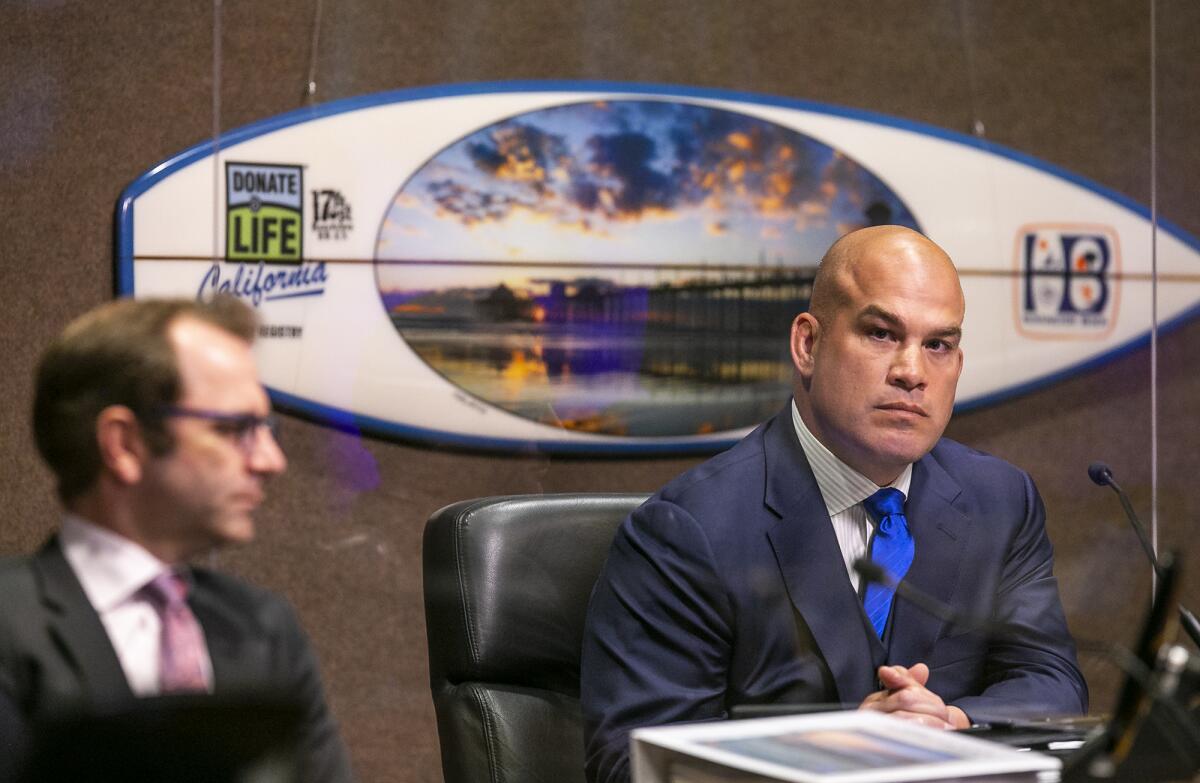
Ortiz, a fervent supporter of former President Trump, received more than 42,000 votes — the most in a council race in the city’s history — only to resign less than a year later, citing persistent attacks for his refusal to mask during meetings and at local businesses.
So clearly has Huntington Beach been labeled MAGA country that it’s on the radar of the former president. Trump’s plane flew over Huntington Beach on the first day of this year’s September Pacific Airshow, one of the city’s most popular events, a sighting that organizers called an appearance by a “special guest.”
A longtime GOP stronghold, Republicans still make up the majority of voters in Huntington Beach. But the number of registered Democrats and Independent voters has risen in recent years, and the demographics have grown more diverse. About 60% of residents are white and nearly 20% are Latino. Unlike many beach communities in Southern California, the city is economically mixed, with wealthier residents generally living closer to the coast and more middle-class folks residing inland.
As the city has become more purple, residents say politics has created a divide, with each side jockeying for more power on the City Council.
In 2021, the council had a short-lived ride with a liberal majority. In 2022, the council took a hard swing right with the election of Strickland, a former state assemblyman and senator who runs a political consulting firm; retired police officer Pat Burns; Huntington Beach businessman Casey McKeon; and Gracey Van Der Mark, a vocal parental rights activist.
The four campaigned as a slate, emphasizing what many residents see as issues core to daily life in Huntington Beach. They would crack down on homeless encampments, ensure business-friendly regulations and allow the city attorney to pursue legal fights to buck state mandates on housing and other issues.
But, once elected, the new majority pushed a social agenda that some residents see as outside the purview of local elected officials — and not central to the daily activities of the people working and living in the city.
“It’s definitely a culture war of sorts going on down here,” said resident Carol Daus. “It’s just wearing to people who’ve lived here, like I have for so many years. It used to be the council would work together to build things up. And, right now, it’s all about tearing things down.”
Santa Cruz leaders say downtown high-rises would ease housing costs. Activists call the plan ‘out of character’ for the laid-back beach town and are fighting new construction.
That’s not to say the new majority is without support. A vocal faction of local conservatives applaud their efforts to erase “woke” liberalism and battle a state government that doesn’t represent their values.
Resident Cari Swan led an unsuccessful charge last year to recall some members of the former City Council, including a Republican who she said too often voted with Democrats.
Recall proponents at the time cited frustration with the council’s fraying relationship with hard-charging City Atty. Michael Gates, who had made a name for himself fighting state officials on immigration and zoning laws. They took issue with the council appointing Rhonda Bolton, a Democrat and the city’s first Black councilmember, to the seat vacated by Ortiz rather than holding a special election. Bolton’s appointment created the fleeting tenure of a Democratic majority.
“They came on so aggressive with a massive government intrusion,” Swan said of the prior council, adding that they “pushed us so far to a bigger government footprint that it created this pendulum swing.”
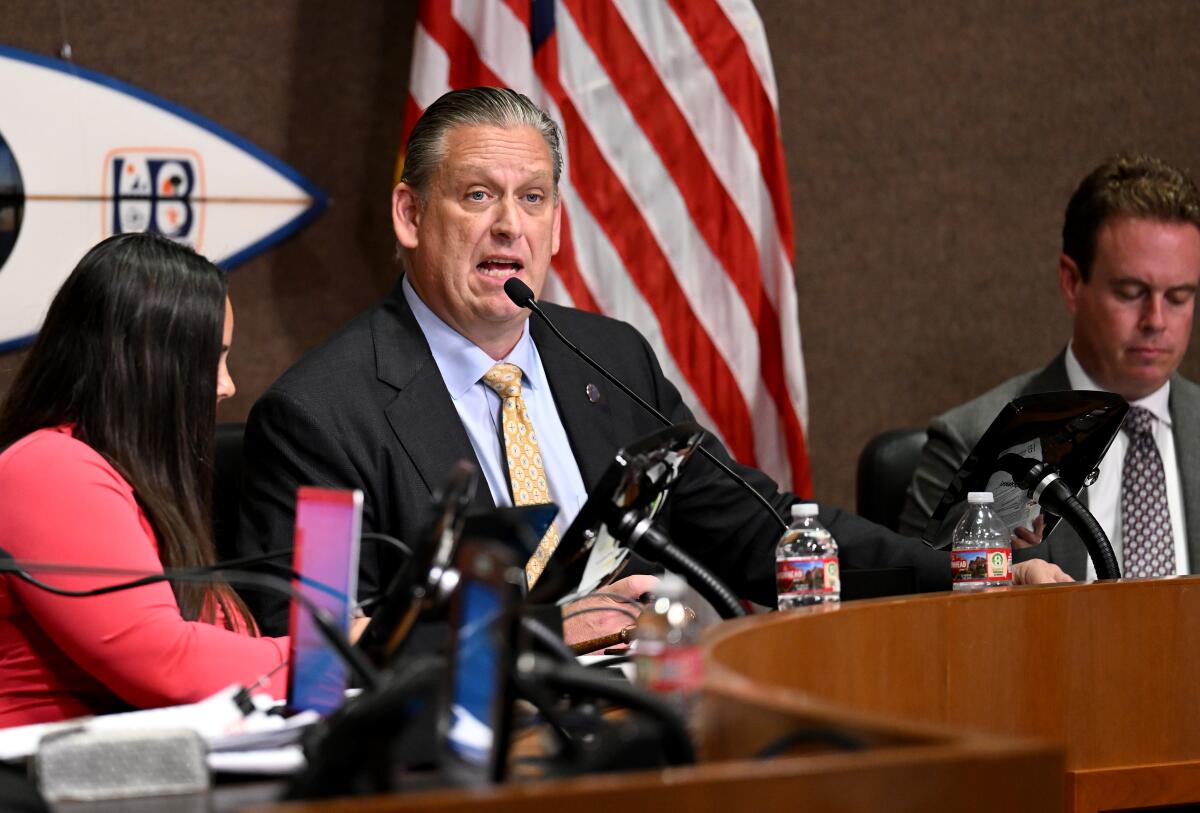
Sue Welfringer, a 27-year resident of Huntington Beach, voted for the four candidates on the basis of their campaign platforms. Their messaging around housing — and keeping Huntington Beach a manageable size — appealed to her, as well as their promise to help local businesses thrive.
Instead, she has watched, aghast, as the council voted to police library books, ban the Pride flag and rewrite a decades-old human dignity resolution to delete all mention of intolerance of hate crimes. It’s all been too much, she said, adding that she’s now embarrassed to tell friends and neighbors that she voted for the new majority.
“Which one of our council members campaigned on the platform of changing our library collection?” she asked. “I must have missed that message. I feel duped.”
As board president of Chino Valley Unified, Sonja Shaw has catapulted from soccer mom to the face of California’s parental rights movement. She’d say it’s part of God’s plan.
Like Welfringer, many residents found themselves alarmed — and uncomfortable — last summer when the council dissolved a human relations committee formed more than two decades ago after the 1990s-era murder of a Black man and attempted murder of a Native American at the hands of white supremacists.
In those same years, Huntington Beach garnered notoriety as a gathering spot for white supremacists, a reputation that has dogged the city. In April 2021, a White Lives Matter protest at the Huntington Beach pier drew a cross-section of far-right proponents, including gun-rights supporters and anti-abortion advocates, as well as members of the extremist militia group Proud Boys. Hundreds of counterprotesters also showed up, holding signs that read “Death to the Klan” and chanting “Nazis go home.”
Leaders have worked for years to rebrand the community, leaning into its “Surf City” image as a family-friendly locale for ocean outings and a place where families move to raise their children.
As part of that effort, the City Council in the 1990s passed a Declaration of Policy About Human Dignity aimed to unite the community. The original document stated Huntington Beach “declares that everyone should be treated with courtesy and respect, regardless of their racial background, their nation of origin, the religion they practice, their sexual orientation, gender or disability status. It is the right of all citizens to pursue their daily lives with the knowledge that they will not be physically harmed or verbally abused.”
Shortly after the new council majority was elected, they voted to dissolve the human relations committee tasked with upholding the policy and later voted 4-3 to approve a new document that removed references to hate crimes. The new resolution references protecting children from “exploitation and sexual grooming” and states that the city “will recognize from birth the genetic differences between male and female and respect the strengths and benefits of each.”
The terminology is widely seen as a dog whistle for evangelicals and social conservatives such as Gov. Ron DeSantis in Florida, who has used similar language to roll back recognition and rights of the LGBTQ+ community.
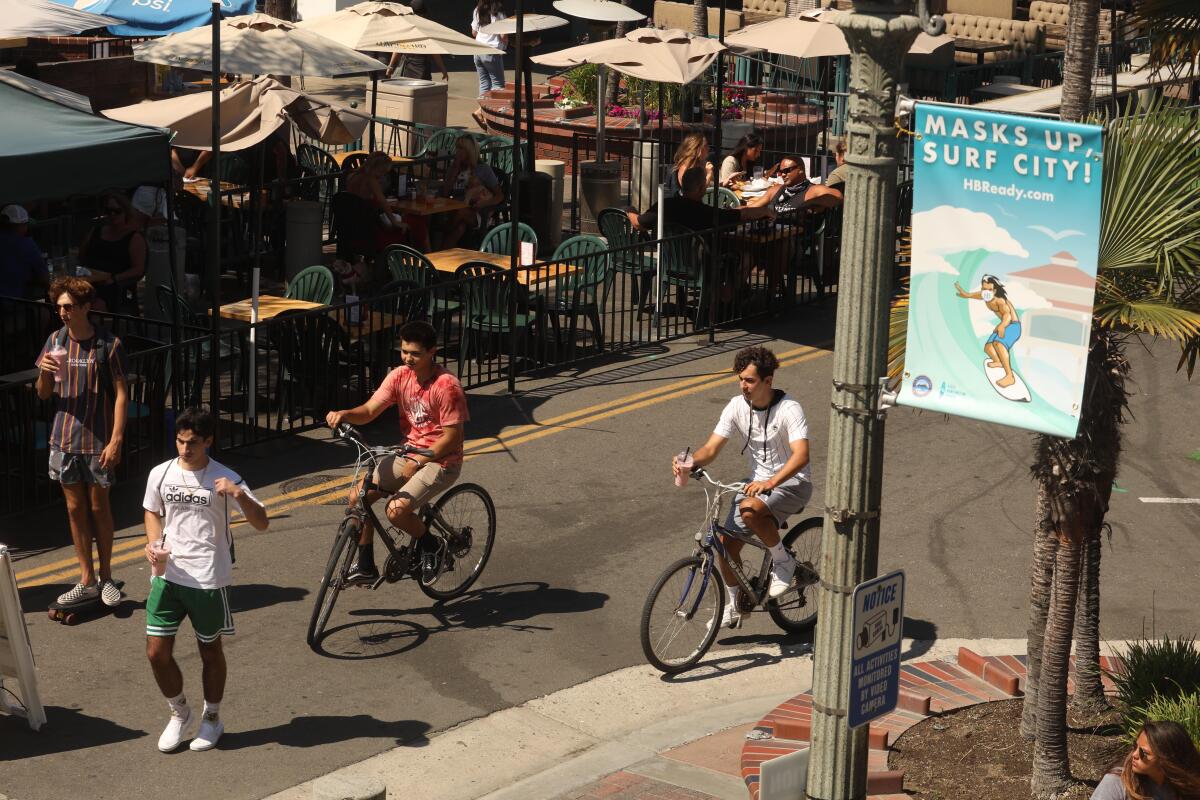
In October, Van Der Mark put forth a resolution, passed by the council, to declare that mask and vaccine mandates are banned within the city’s jurisdiction. The resolution provides exceptions for those who test positive for COVID-19 and allows businesses the right to impose mask or vaccine requirements.
Opponents called it a political stunt designed to draw attention. Van Der Mark did not respond to multiple requests from The Times for comment for this story.
Days later, the council took up another hotly debated national issue: requirements for voters to show identification at the polls. Opponents to such requirements note cases of in-person voter fraud are rare and say such policies are aimed at disenfranchising marginalized populations, who often lack photo IDs. Under California law, voters generally are not required to show identification when casting a ballot. The exception is when a would-be voter has not provided the forms necessary to legally establish identity during the registration process.
Secretary of State Shirley Weber and Atty. General Rob Bonta sent a letter to the council urging them to abandon the proposed amendment to the city charter, saying it runs afoul of state election laws. Nonetheless, the council voted to place a measure on the March ballot asking voters to decide whether IDs should be required at the polls.
Strickland acknowledges these issues are not typical for city councils, but said, “they are issues that have been brought to us by constituents.”
In contrast, Bolton, the council member appointed in 2021, said she sees a group of local politicians taking their cue from a new generation of polarizing conservative leaders making waves on the national front.
“What’s happening at the national level — the dysfunction and the partisanship — it’s all just trickling down,” she said. “I’m frequently critical of what I see happening because, I’m like, you’re importing all of these issues into our public policy discussions that don’t have anything to do with us. They’re not relevant.”
Bolton, an attorney, hopes the council can get back to shaping local measures critical to a smooth-running city. The focus, she said, should be on the city budget, which is facing a $259,000 deficit in 2024-25, affordable housing, and ensuring communities such as Oak View, with a relatively high population of Latino residents, have the resources they need.
“If there’s one awesome thing that has happened — you could call it a silver lining — from all of this upheaval, it’s that there are a lot of people now who are engaged with local politics who had never paid attention before,” Bolton said.
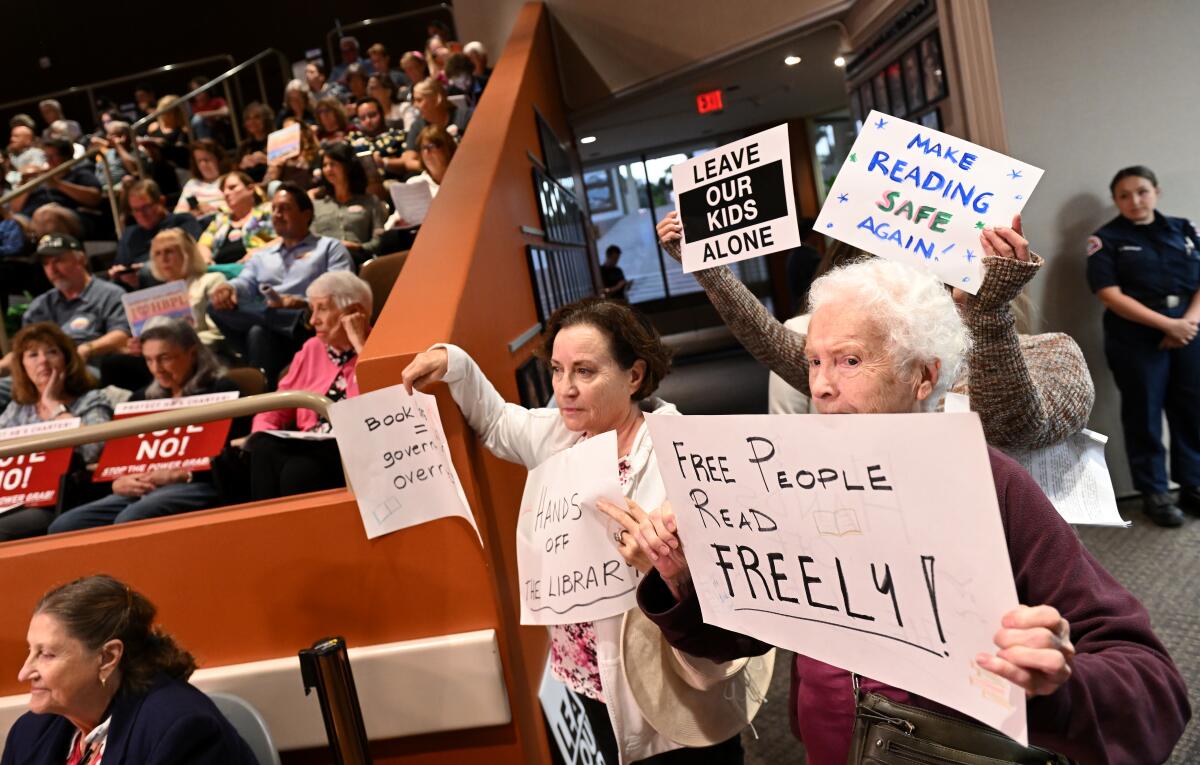
One of the more controversial episodes, residents say, has been Van Der Mark’s book-cleansing campaign — mainly a move to bar sex education materials and books with LGBTQ+ themes from the children’s section of the city library. Van Der Mark sought more oversight of children’s books even before she was elected to the council. In 2020, she initiated a successful challenge to remove “Gender Queer: A Memoir” from the library’s young adult/teen section.
At an October meeting, the council majority voted to establish a 21-member advisory board empowered to review and remove materials in the library’s children’s section and to determine what new titles will hit the shelves going forward.
Hundreds of residents flooded the council chambers, where most spoke in opposition to a policy they said equated to a book ban. They held signs reading “Free people read freely” and “Leave our kids alone.”
Some residents fear the relentless focus on ideological issues will drive away newcomers and tourists. “Honestly, I’ve talked to young people who don’t even want to say they’re from Huntington Beach,” Welfringer said.
But for many others, the council majority are local celebrities. At a meeting this month, the council chambers erupted in hoots and applause when Van Der Mark was installed as the city’s 86th mayor.
Van Der Mark, wearing sparkling heels emblazoned with red, white and blue rhinestones in the shape of a flag, walked through the crowd hugging attendees. Some held signs pledging support. Others wore red baseball caps bearing her name. The night was historic, her fans said, as Van Der Mark became the first Latina in city history to hold the ceremonial post.
“The city has been set on a great course,” Van Der Mark told the crowd.
Outgoing Mayor Strickland, handing over the gavel, gleefully concurred: “I do believe Huntington Beach’s best days are in the future.”
More to Read
Sign up for Essential California
The most important California stories and recommendations in your inbox every morning.
You may occasionally receive promotional content from the Los Angeles Times.
